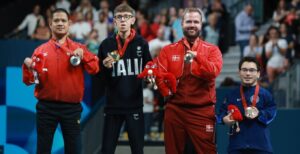In 2021, Ian Seidenfeld was a first-time Paralympian, pulling off an upset to win a table tennis gold medal in the Tokyo games. Earlier this month in Paris, Seidenfeld wasn’t able to pull off the repeat, but he brings home hardware nonetheless, finishing as one of two bronze medalists.
The difference in his attitude and approach made for a very different experience.
“I had a lot more confidence. The last time I was thinking, ‘Do I deserve to be here?’ This time, it was more about I’m going to perform well, I know what to do and what I want to accomplish,” he said after his return home. “I could focus more on just getting into a groove and feeling comfortable on the table. And there wasn’t very much to think about, other than, you know, what am I going to do for the next next match? I wasn’t getting in my own way.”
Seidenfeld lost his semifinal match to eventual gold medalist Matteo Parenzan of Italy. Rather than play a bronze medal match between the two defeated semifinalists, organizers opted to give to bronze medals; Seidenfeld would have played Peter Rosenmeier of Denmark, who he beat for gold in 2021.
“I would have beaten him,” Seidenfeld said. “As a competitor, I don’t love it. I think they cut it for time, but there’s more of a financial benefit for getting an automatic bronze, rather than playing for third or fourth place.
“It takes the stress out of it, and the games are pretty stressful in and of themselves.”

From right: Lakeville’s Ian Seidenfeld, Peter Rosenmeier, Matteo Parenzan, and Rungroj Thainyom with their medals for the Men’s Singles Class 6 Table Tennis at the 2024 Paris Paralympic Games. (courtesy)
Table Tennis at the Paralympics is divided into 10 classes. Mitch Seidenfeld, Ian’s father and coach, explained in 2021 that Classes 1-5 are for wheelchair athletes and 6-10 for standing athletes. The lower the number in each class, the more severe impairment. Ian calls himself a low-end Class 6 because of his short limbs. He has pseudoachondroplasia, a type of dwarfism. He said that many with this condition have joint problems because they don’t have cartilage and their hips aren’t properly formed. His short stature led to a competition problem that has plagued him for several years because he is served short – serves made to drop just over the net and spin back towards the side in which came. Because of his stature, those serves are extremely difficult for him to reach.
His match against Parenzan was played in that way, and it left him feeling frustrated.
“He’s a decent person, but on the table, the way he plays is he serves short, and then goes short again,” Seidenfeld said. “He exploits my disability quite a bit.They seem to have normalized that a little bit too much in paratable tennis. And I have to go along with it.
“I may sound a little bitter, but I felt good about the match. Actually, I felt good about how I played the entire tournament, actually.”
One of the differences that many Olympians that took part in the Tokyo Games and again in Paris was the return of fans; the Games in 2021 were delayed a year due to the COVID-19 pandemic, and fans were not permitted to be in the venues.
“I think the fans were the best aspect of the Games. They really made it something special,” he said. “They were such a positive force throughout. I didn’t play any French players, but I could feel the support, even as an American there, that they just wanted to see good points and a good competition.”
Winning Paralympic medals is part of a family legacy. His father was the 1992 Paralympic champion in Barcelona in Class 8, silver and bronze medalist in Atlanta in 1996, and the 1990 World Champion. With two Paralympic medals around his neck, his plan is to try again in Los Angeles in 2028. Seidenfeld works for Allianz which he said has been very supportive of his competing, including not making him take paid time off to compete.
“I believe they’ll allow me to continue to train for LA 2028 and I have no intention of stopping,” he said, looking forward to winning another gold rather than completing the set of medals. “I feel really good about my chances. I would like a gold, but silver wouldn’t be the worst. But I’d like to end the tournament on a win. That’s usually a better feeling.”

